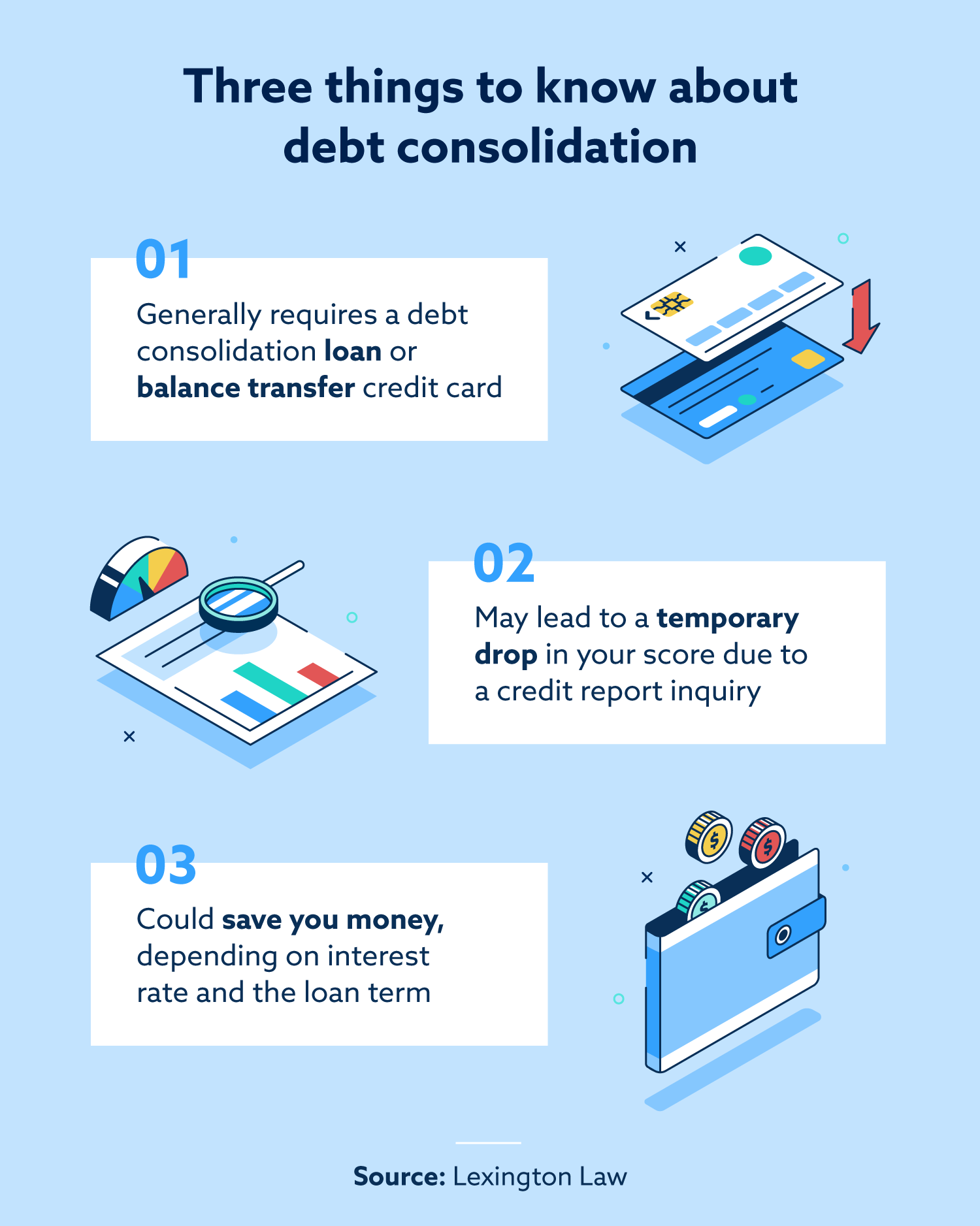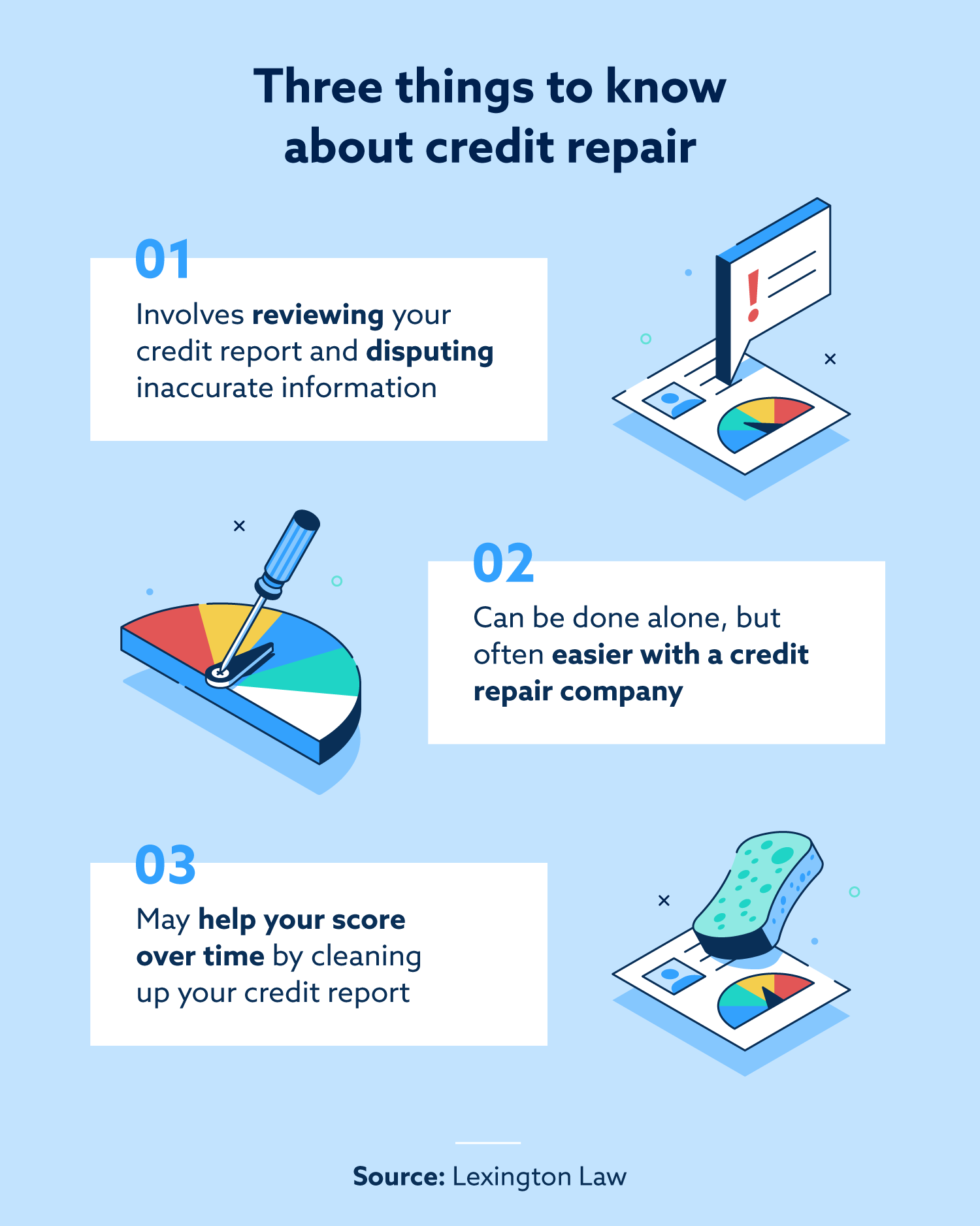
The information provided on this website does not, and is not intended to, act as legal, financial or credit advice. See Lexington Law’s editorial disclosure for more information.
In general, debt consolidation is useful if you have several debts with different interest payment schedules and interest rates. On the other hand, credit repair is most helpful for those who are looking to clean up their credit reports and ensure they have an accurate credit report.
Both credit repair and debt consolidation can be helpful for people who are looking to improve their credit score. That said, consolidating debt and repairing credit work best in different situations, so it can be helpful to understand when to consider each approach.
In general, debt consolidation is useful if you have several debts with different interest payment schedules and interest rates. By consolidating these debts together with a lower interest rate, you may be able to save money and simplify your payments.
On the other hand, credit repair is most helpful for those who are looking to clean up their credit reports and ensure they have an accurate credit report. Some credit repair companies can offer legal support and credit counseling to help improve credit in both the short and long term.
When considering whether debt consolidation or credit repair may be right for you, keep the following differences in mind.
| Debt consolidation | Credit repair | |
|---|---|---|
| Definition | A strategy for simplifying payments and reducing interest by combining multiple debts | A plan to rebuild credit by disputing credit report errors and verifying information with creditors |
| Cost | Free, though you may need a certain credit score to qualify for a debt consolidation loan | Free to do on your own, and anywhere from $10 to $250 per month to work with a professional company |
| Who is it for? | Generally best for people with decent credit scores looking to simplify debt payments that are already under control | Helpful for anyone with a lower credit score, difficulties managing credit or an inaccurate credit report |
| How does it affect credit? | May temporarily reduce credit score due to hard inquiry, but can improve score over time | Not guaranteed to improve score, but often has a positive effect over time |
Read on to learn more about the differences between credit repair and debt consolidation.
How does debt consolidation work?
Debt consolidation enables people to combine multiple debts into one, which can have the effect of simplifying payments or lowering your interest rate. For example, if you have multiple credit card debts, you may be able to combine them, making it easier to keep track of your debt.

If you’re considering debt consolidation, consider your options for merging multiple debts, the effects on your credit score and whether debt consolidation will save you money in the long term.
What are your options for debt consolidation?
To combine your debts, you generally have two options: a debt consolidation loan or a balance transfer credit card.
- Debt consolidation loans are a type of personal loan you can take out to combine multiple types of debt, like medical bills, credit cards or other loans.
- Balance transfer cards are a type of credit card that enable you to transfer multiple debts directly onto the card. Some cards offer a promotional 0 percent interest rate, which means you may save money if you pay your debt during the promotional period.
Debt consolidation is generally easier to obtain if you already have a good credit score, though it may be possible to get a debt consolidation loan with a lower credit score if you search for certain lenders or offer an asset as collateral for the loan.
How does debt consolidation affect your credit score?
Debt consolidation can initially lead to a drop in your credit score due to the hard inquiry on your credit report required to secure the loan or balance transfer card.
That said, if debt consolidation enables you to make on-time payments going forward, the overall effect on your score is likely to be positive over time.
Does debt consolidation save you money?
When deciding whether to consolidate your debt, it’s important to look at the loan’s interest rate and term to determine whether you’ll save money.
For example, your debt consolidation loan may have a lower interest rate but a longer term. Ask the lender to see the total cost of the loan, including interest payments, over its entire term. That way, you’ll know whether the loan is actually saving you money.
Additionally, you’ll want to make sure that you can make consistent payments on the new loan. Defaulting on your consolidated debt could lead to a collection account, which would harm your score and cost you more in the long run.
If you are currently struggling with your credit, you may want to consider credit repair as an alternative to debt consolidation.
How does credit repair work?
Credit repair is the process of reviewing your credit report and disputing inaccurate information. Everyone has the right to do credit repair themselves, but it often helps to work with an experienced credit repair company that knows what to look for and how to communicate with lenders and the three credit bureaus.

When you’re determining whether to start the process of repairing your credit, consider what credit repair can and cannot do, whether you want to do it by yourself or with a professional company and what effects it may have on your credit score.
What can credit repair do for you?
The credit repair process can help you identify and dispute negative items on your credit report that are inaccurate. For example, fraudulent accounts resulting from identity theft, incorrect balances or other mistakes on your credit report could be unnecessarily dropping your score. Disputing these items can lead to their removal, which may in turn boost your score.
Keep in mind, however, that credit repair typically does not mean removing accurate information from your account or making debt disappear. Furthermore, credit repair is not guaranteed to improve your score. If you’re considering working with a credit repair company, watch out for scams or illegitimate companies that make extreme claims about results.
Can you do credit repair on your own?
Anyone can work to repair their own credit, which simply involves reviewing your credit report, contacting lenders and filing disputes with the three credit bureaus. That said, the process can be time-consuming and occasionally involved. For that reason, many people choose to work with a credit repair company.
Benefits of working with a professional company include:
- Support from a staff of professionals with credit repair experience and knowledge (and at Lexington Law, we have credit repair attorneys with expertise in the legal aspects of credit repair)
- A professional review of your credit report
- Opportunity for you to focus on your own credit habits while consultants contact the credit bureaus on your behalf
If you’re on the fence about working with a professional credit repair company, consider a credit consultation where you can discuss your needs and review your options.
How does credit repair affect your credit score?
While credit repair is not guaranteed to increase your score, it often has a positive effect. Additionally, the actions associated with credit repair—checking a credit report and filing disputes with the credit bureaus—generally don’t affect scores, but note that if your score is negatively affected, it should be only temporary as things are sorted out.
If successful, credit repair can boost your score by removing false information from your report that could be lowering your score.
Should you consolidate your debt or repair your credit?
Overall, both debt consolidation and credit repair offer benefits for individuals looking to manage their credit.
- If you have a good credit score and want to potentially simplify your payments, lower your interest rate or change the length of your loan, debt consolidation may be a good choice for you.
- If you have a lower credit score or know that you have inaccurate or fraudulent information on your credit report, credit repair is likely a good option.
Ultimately, the best choice for managing debt will depend on your individual circumstances. Consult with your financial advisor or another professional to determine the best course of action.
If you’ve decided that credit repair could benefit you, working with the credit professionals at Lexington Law Firm can help you determine the best way forward.
Note: Articles have only been reviewed by the indicated attorney, not written by them. The information provided on this website does not, and is not intended to, act as legal, financial or credit advice; instead, it is for general informational purposes only. Use of, and access to, this website or any of the links or resources contained within the site do not create an attorney-client or fiduciary relationship between the reader, user, or browser and website owner, authors, reviewers, contributors, contributing firms, or their respective agents or employers.
